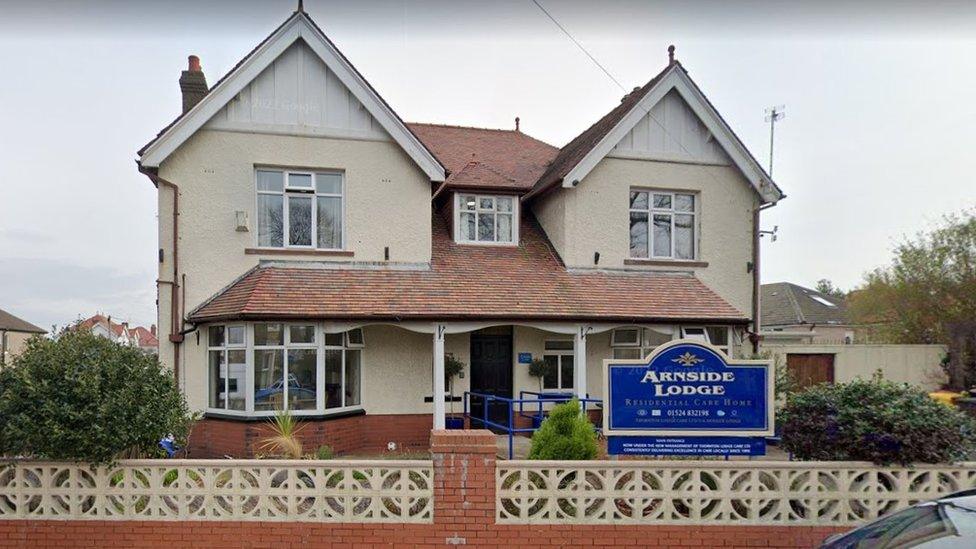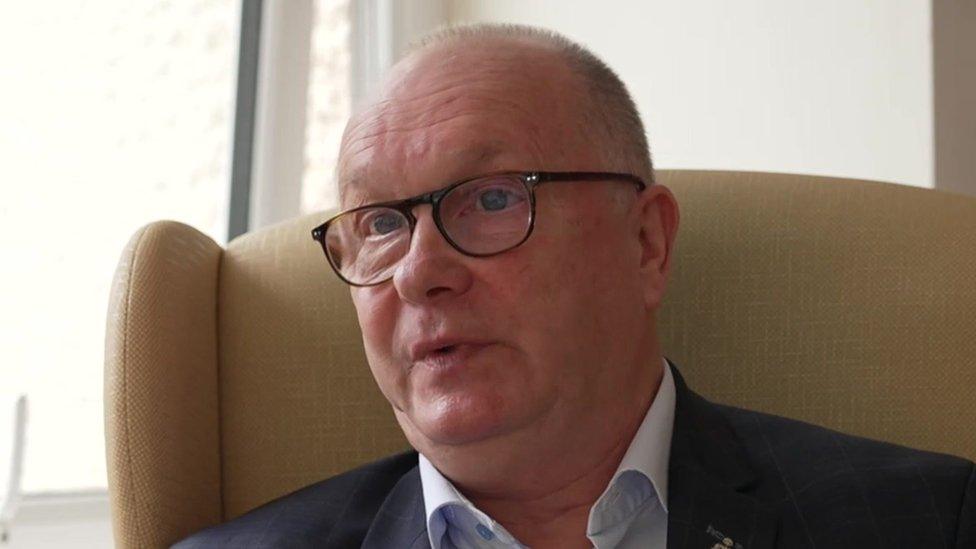Morecambe care home owner says sector is on a 'cliff edge'
- Published

Arnside Lodge in Morecambe is one of many care homes struggling to fill staff vacancies
A care home owner has said the sector was on a "cliff edge" due to soaring levels of demand and the highest ever reported rate of staff vacancies.
Rod Taylor's company Morecambe Care Ltd runs four care homes in the Lancashire seaside town.
Despite increasing salaries by 16% he said he was still struggling to retain staff since many had left for better-paid jobs, including in supermarkets.
The government said it had made £7.5bn available to support the care sector.
Between 2020-21 and 2021-22, the social care vacancy rate rose from 7% to 10.7%, according to charity, Skills for Care.
The health and social care charity also said there were currently 165,000 posts unfilled across England.
Kelly Jobes works at Arnside Lodge in Morecambe, which specialises in dementia care.
The 34-year-old returned to work as a senior care assistant nine months ago, after taking time out to have her children.
"A normal day is very busy - you're always on the go, there's always something to be done," she said.
"I do it, like many people, because I actually like it. It's not a great wage for what we do every day, but if you enjoy it, it's not all about the money."
'Draining'
However she acknowledged many had quit the sector due to the soaring cost of living.
Ms Jobes said: "There aren't as many carers out there and there aren't as many people who want to be carers any more.
"They've gone out and seen they can get the money in a supermarket, so that's what they're doing."
Despite this knowledge, Ms Jobes said she did not want to follow them.
"We do get days that are very challenging, it's mentally and physically draining," she said.
"Some days you get home and you're exhausted, but you come back the next day and do it all again."

Rod Taylor says every 50p on a basic care assistant's hourly rate equates to £100,000 per year additional costs
Mr Taylor said the whole care sector was "creaking".
"Part of it is Covid," he explained. "But it's now gone beyond that, I think we're on a cliff edge, I really do."
Care workers on the national living wage earn £9.50 an hour.
Mr Taylor said he paid his carers working in his company's four homes, including Arnside Lodge, £11 an hour.
"We've been in the fortunate position that we had some reserves. We've increased our pay to our staff by nearly 16% since last June and we shall review it again."
Increased salaries have to be funded somehow, though, and Mr Taylor said this was getting harder.
"Every 50 pence on a basic care assistant's hourly rate equates to £100,000 a year to us," he explained.
Lancashire County Council spends £1.5m a day on adult social care - the majority of its budget.
It's still not enough - councillors recently agreed to increase spending by £1.8m to help ease the pressure.
It means residential care homes will get at least 16% more a year from this April.
Councillor Graham Gooch, cabinet member for adult social care, said: "It goes without saying that it's essential to ensure people continue to get the social care support they need in what is currently a very challenging time for the care sector."
A Department of Health and Social Care spokeswoman said: "We have made up to £7.5bn available over the next two years to support services - the biggest funding increase in history. This will help local authorities address waiting lists, low fee rates, and workforce pressures in the sector.
"Most paid carers are employed by private sector providers who set their pay and conditions independently, but the government has raised the national living wage by 9.7% to £10.42 an hour for workers aged 23 and over."
She added: "We are working to reduce vacancies through a domestic recruitment campaign, £15m investment in international recruitment and making care workers eligible for the health and care visa."

Why not follow BBC North West on Facebook, external, Twitter, external and Instagram, external? You can also send story ideas to northwest.newsonline@bbc.co.uk